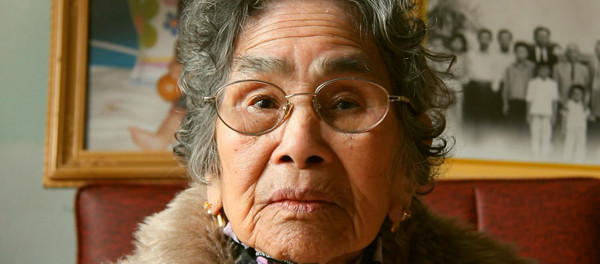Family and Tradition Linger On In Bà Nôi (Grandmother)
Article Max Lett
“You never saw him… only in images.” Bà Nôi chides her grandson about his deceased grandfather in the film Bà Nôi (Grandmother) by Khoa Lê. These are simple words fraught with a kind of ancestral, spiritual meaning, a gulf between cultures that Lê attempts to bridge in this biographical documentary.
The depths of Vietnam are plumbed and familial roots are surreptitiously exposed as Khoa follows his estranged relatives with a small camera crew.
Emphasis is put on the eponymous Bà Nôi (grandmother) who insists on being photographed in her best fur coats. In one of the many unfiltered exchanges between the filmmaker and his matriarch, he attempts to explain that they aren’t there to take pictures but instead to film her. She seems un-phased. A proud and aging native of her village, Bà Nôi laments the distance between her and her son (Khoa’s father) and his family.
As the story progresses we discover that Khoa Lê’s father took him, his sister and their mother to Canada when they were young, effectively fissuring the family and estranging them from their roots. Over the years, Khoa has returned to his land, although infrequently, as he is reminded by his grandmother.
Khoa is stuck in the middle. Undoubtedly imbued with his father’s ambition to forge a new life, to attain success and wealth, and yet yearning to discover his heritage and better understand himself. He finds in his grandmother a source of affection and generosity but also of guilt. In a phone conversation with his father, Khoa learns that his aunt died when a boat he and his family were supposed to board sank and its passengers drowned.
A comparison is made between Vietnamese tradition and North American culture. Ancient rites and religious ceremonies are faithfully performed and attended, superstitions are laid bare. The question — why do these people cling to their old ways? — remains unasked but is present all the same.
Khoa celebrates New Years with his grandmother, he attends shows and ceremonies with his relatives, yet still we are left with the uncanny impression of a young man who is lost and estranged from the festivities.
This is a story of guilt, of unresolved issues between descendants and progenitors. It is a story which blurs the boundaries of country and culture: the struggle between the responsibility to one’s family and the pull to evolve and better oneself.
The cinematography is simplistic and suggestive, capturing the Vietnamese countryside in all its beauty. We are privy to personal discussions, squabbles and laughter. A haunting shot is repeated throughout of am old man walking through burning forests and whose shadow passes over the city sites. He seems to embody the return to one’s ancestries.
The film is intermittently scored by the ever swelling voice mails on Khoa’s answering machine, family and friends attempting to reach him as he sinks ever further into his grandmother’s memories and regrets.
“…My riches are yours, my rubbish and scrap too.” This sums up Bà Nôi’s relationship with her grandson literally as well as metaphorically. She is burdened with loss and she fears Khoa Lê may succumb to the same fate.
Bà Nôi is as beautiful and unfiltered as its subject, wordlessly evoking a struggle that we have (or will) all face at some point. It is a piece that breaths in places as if entreating us to remember our own roots, to ask ourselves how family figures into the plan.
Bà Nôi opens January 31 at Cinema Excentris (French ST) and Feb 6 at Cinema du Parc (English ST).







